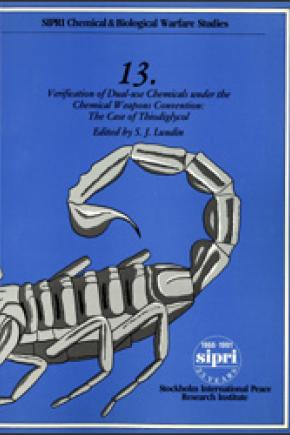Verification of Dual-use Chemicals under the Chemical Weapons Convention: The Case of Thiodiglycol
In negotiations on the Chemical Weapons Convention delegates have addressed the question of how to verify compliance with those provisions which relate to the production and non-production of relevant chemicals. In order to facilitate the work of the negotiators, the Pugwash movement and SIPRI gave a group of fourteen scientific and other experts on the negotiations the task of analysing how the current Convention provisions would be applied to a specific chemical, thiodiglycol. This chemical can be used as a precursor to the chemical warfare agent, mustard gas. In eleven chapters and an annexe, the authors present their individual findings, illustrated with tables and figures. The steering committee of the project have provided summaries in introductory and concluding chapters. The particular problems of monitoring thiodiglycol production outlined may serve as a model for monitoring other chemicals which will be covered by the future Chemical Weapons Convention.
Contents
1. Introdution (Martin M. Kaplan, Nicholas Kyriakopoulos, S. J. Lundin, J. P. Perry Robinson and Ralf Trapp)
2. Production and chemistry of mustard gas (J. P. Perry Robinson and Ralf Trapp)
3. Thiodiglycol (Ronald G. Sutherland)
4. Global survey of thiodiglycol (Robert J. Mathews)
5. Simple methods for detection and identification of diversion to mustard gas during the thiodiglycol life cycle (Jirí Matousek)
6. The application of portable vapour detectors in verification of non-production of chemical warfare agents (Robert J. Mathews)
7. Chemical process monitoring by automated micro-sampling on magnetic tape and retrospective on-site evaluation (Bernhard Odernheimer)
8. The role of analytical chemistry in monitoring the life cycle of thiodiglycol (Marjatta Rautio)
9. A model for monitoring the production and distribution of thiodiglycol (Nicholas Kyriakopoulos)
10. Random sampling for verification of compliance with a Chemical Weapons Convention (Rudolf Avenhaus and Morton J. Canty)
11. US national trial inspection at a thiodiglycol facility (Sigmund R. Eckaus)
12. Some technical aspects of verification of the non-production of chemical weapons in the chemical industry (Yuri V. Skripkin)
13. Summary and conclusions (Martin M. Kaplan, Nicholas Kyriakopoulos, S. J. Lundin, J. P. Perry Robinson and Ralf Trapp)
Annexe. Pugwash meeting reports
About the editor
Dr S. J. Lundin, who assumed responsibility for the SIPRI CBW programme in 1987, is the Series Editor. He has served as a Director of Research of the Swedish National Defence Research Institute (FOA), and was for 16 years Scientific Adviser to the Swedish Delegation to the Conference on Disarmament in Geneva. He has been a consultant to the United Nations Centre for Disarmament, and has convened SIPRI and Pugwash symposia on matters relating to chemical weapons.
SIPRI Chemical & Biological Warfare Studies is a series of studies intended primarily for specialists in the field of CBW arms control and for people engaged in other areas of international relations or security affairs whose work could benefit from a deeper understanding of particular CBW matters.
This book can be ordered from all good bookshops and online booksellers or directly from OUP
OUP in the UK:
http://www.oup.com/uk/catalogue/?ci=9780198291565 (paperback)
OUP in the USA:
http://www.us.oup.com/us/catalog/general/?view=usa&ci=9780198291565 (paperback)

